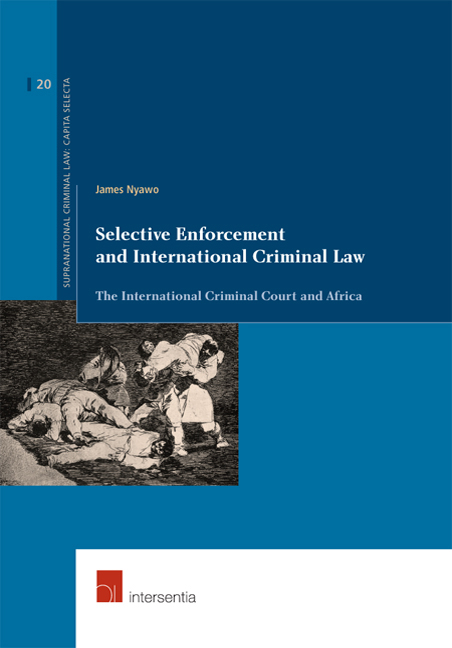Book contents
- Frontmatter
- Dedication
- Preface
- Acknowledgements
- Contents
- Epigraph
- Chapter 1 Introduction
- Chapter 2 The Establishment of the International Criminal Court, and Africa's Role and Early Support
- Chapter 3 The Office of the Prosecutor and the Politics of Selecting Targets for Prosecution
- Chapter 4 State Party Referrals, UN Security Council Referrals and the Selection of Situations
- Chapter 5 Assessing Selective Enforcement from an Admissibility Perspective
- Chapter 6 The AU and African States’ Shift from Cooperation to Non-Cooperation with the Court
- Chapter 7 African States’ Reaction to the AU's Call for Non-Cooperation with the Court
- Chapter 8 Africa and the International Criminal Court: The Lessons and Prospects
- Bibliography
- Index
Chapter 4 - State Party Referrals, UN Security Council Referrals and the Selection of Situations
Published online by Cambridge University Press: 25 September 2018
- Frontmatter
- Dedication
- Preface
- Acknowledgements
- Contents
- Epigraph
- Chapter 1 Introduction
- Chapter 2 The Establishment of the International Criminal Court, and Africa's Role and Early Support
- Chapter 3 The Office of the Prosecutor and the Politics of Selecting Targets for Prosecution
- Chapter 4 State Party Referrals, UN Security Council Referrals and the Selection of Situations
- Chapter 5 Assessing Selective Enforcement from an Admissibility Perspective
- Chapter 6 The AU and African States’ Shift from Cooperation to Non-Cooperation with the Court
- Chapter 7 African States’ Reaction to the AU's Call for Non-Cooperation with the Court
- Chapter 8 Africa and the International Criminal Court: The Lessons and Prospects
- Bibliography
- Index
Summary
This chapter explores how the referrals of situations by states parties and the UN Security Council reflect their desire to ensure that international rule of law is applied in the global fight to end impunity. The chapter will highlight the referral systems used in other international human rights law machinery – namely the inter-state complaint procedure. The assumption is that the state referral mechanism in the Rome Statute was modelled on the inter-state complaint procedure. Although the state referral mechanism has not been operationalised, its analysis as applied to other human rights mechanisms could give an indication of the likelihood of it being used to refer situations to the Court. It could also be that if state referrals were to be implemented based on inter-state complaint procedures, the courts could end up opening investigations in situations occurring outside the African continent. We will then discuss the development of referral mechanisms in the travaux préparatoires of the Rome Statute and finally analyse the relationship between referral mechanisms and selective targeting, how the UN Security Council has referred situations to the Court and how states parties have also used the referral system.
OUTLINING THE REFERRAL SYSTEM IN INTERNATIONAL HUMAN RIGHTS
International and regional human rights treaties contain provisions outlining their implementation procedures. These procedures ensure that the treaties are respected and that, in the event of violations, appropriate action is taken to ensure that there is some form of international accountability. To that effect, one of the ways that they ensure accountability is through the inclusion of inter-state complaint procedure. For example, Article 41 of the International Covenant on Civil and Political Rights provides that a state party can file a formal complaint with the Human Rights Committee when another state party is not fulfilling its obligations. The constitution of the International Labour Organization, an organisation that, in addition to being concerned with the furtherance of international industrial relations, also aims to protect fundamental human rights and provides that ‘ any of the Members shall have the right to file a complaint with the International Labour Office if it is not satisfied that any other member is securing the effective observance of any Convention, which both have ratified in accordance with the foregoing articles’.
- Type
- Chapter
- Information
- Selective Enforcement and International Criminal LawThe International Criminal Court and Africa, pp. 97 - 132Publisher: IntersentiaPrint publication year: 2017



